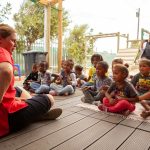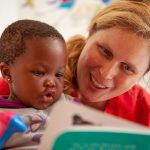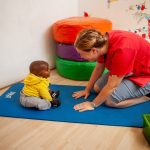Occupational Therapy (OT) week will be celebrated nationally this year from the 16 – 20 September 2020. This annual event/ week is dedicated to OT’s and to promote the many ways that OT’s help all people to reach their full potential.
For the month of September, HOPE Cape Town will celebrate their very own OT’s that work so selflessly to help their patients reach their full protentional. We will be interviewing the “people behind the scenes “ as well as getting a better understanding and insight as to what takes place to make this programme successful.
To kick start this exciting topic, we chat to Robyn Meissner, Occupational Therapist for HOPE Cape Town.
Introduction:
Robyn studied at the University of Cape Town (UCT), where she obtained her bachelors in 2009 and master’s degree in 2016 respectively. She then completed her community service at a small rural hospital in Greytown, KwaZulu – Natal. Since 2011, she has always worked in community clinics across Cape Town, focusing on vulnerable children in the community and those infected and affected by HIV.
1. What is Occupational Therapy?
Occupational therapy focuses on tasks we need and want to do every day. Being able to participate in these tasks contributes to our health and well-being. In children, the focus is on learning the foundational skills to become independent as they grow older. Often things happen in life, be it ill-health or family circumstances, that disrupt our ability to do what we want or need to do. Occupational therapists help you to get back on track with your goals when this happens. We use play, fun and games to practice skills that children will use to help them learn at school, look after themselves in everyday tasks and play at home.
Not many people know that HIV can also have neurodevelopmental effects on children, causing anything from developmental delays, to neurological disorders affecting muscle tone to learning disabilities. It is important for caregivers to be aware of these effects and for us to provide early intervention.
2. How do you apply OT and where does it take place?
At HOPE Cape Town, OT runs therapy services alongside some of the paediatric ID (infectious diseases) clinics at various clinic locations we are involved in. When children see the doctor for their regular check-up, they also have access to OT if needed. For these children I also run GOKidz program which is a play-informed caregiver-implemented home-based intervention that trains caregivers in appropriate developmental stimulation to do at home to prevent delays.
As an OT I also do outreach to the Blikkiesdorp playgroup – assessing the children that attend and providing activity-based groups to work on their developmental and learning needs.
I am also involved in the TBH NDC (neuro developmental clinic) and help with specific child development assessments to help decrease their waiting list.
3 Is Occupational Therapy always something you wanted to do?
I always knew I wanted to work somewhere in the health/medical field, I found occupational therapy to be the perfect balance of science and creativity.
4. What is a typical day at the office?
A typical day for me consists of seeing children and their caregivers in the mornings at various community clinics or outreach projects where we work on the needs of the child through play. My afternoons are spent planning and preparing for future therapy sessions and collaborating with other professionals involved in the child’s life (doctors, teachers, social workers, speech, and other therapists).
5. Do you experience any challenges?
Yes, absolutely! Dealing with difficult circumstances that are not the child’s fault and have little control over really makes it hard for me to digest.
6. Any Highlights?
Seeing children and families rise above their difficult circumstances in different ways. – any smile or laugh from a child achieving something new for the first time.
#OTweek2020 #OTASA





